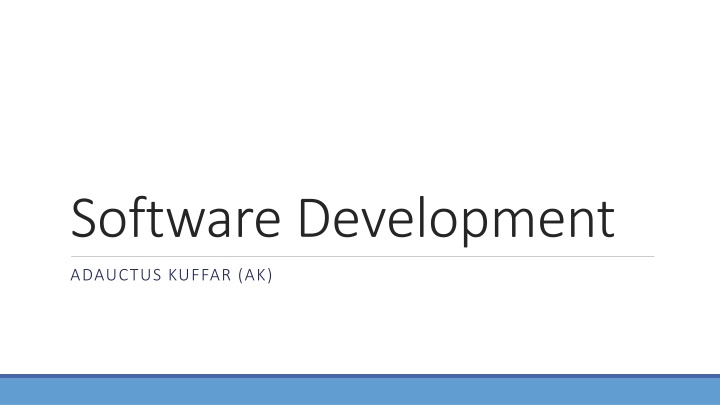
Insights into Software Development Practices and Career Progression
This comprehensive guide provides insights into software development stages, supporting functions, educational requirements, career progression, and tips for high school students interested in pursuing a career in software development. It covers the educational background, typical day-to-day activities, average salary expectations, and recommended steps to advance in the field. The content also delves into the software development process, including design, testing, implementation, and maintenance, along with essential supporting functions like project management, configuration management, and quality processes.
Download Presentation

Please find below an Image/Link to download the presentation.
The content on the website is provided AS IS for your information and personal use only. It may not be sold, licensed, or shared on other websites without obtaining consent from the author. If you encounter any issues during the download, it is possible that the publisher has removed the file from their server.
You are allowed to download the files provided on this website for personal or commercial use, subject to the condition that they are used lawfully. All files are the property of their respective owners.
The content on the website is provided AS IS for your information and personal use only. It may not be sold, licensed, or shared on other websites without obtaining consent from the author.
E N D
Presentation Transcript
Software Development ADAUCTUS KUFFAR (AK)
Introduction Education: BS Electrical Engineering Telecommunication Work: LCC: Wireless Network Designing/Optimization - 2 Years Motorola: cellphone lab and field testing, call software integration/testing, embedded software development, Software process maintenance 11 Years Verizon: cellphone and SIM card testing, wireless products quality control, software requirements, Software testing 12 Years
Software Development Stages A business need A business Solution Design Unit Testing System Testing Implementation Code Inspection Compiling Specifications Brainstorm Requirements Review Merge Changes to latest release Compile Merge inspection Architecture Interfaces Design Review Debug Code Verify input/output Test on a Simulator Test on target environment Requirements Coding Integration
Software Development Supporting Functions Software Project Management (Planning, Assigning Resources, Tracking, Coordinating) Software Configuration Management (Managing development environment, version control, etc) Software Development Process Maintenance (procedures, milestone tracking, training) Software Quality Process and Tools (Change Control, Issue tracking/analysis, code inspection tools)
Q&A Education 1. BS Computer Science or BS Electrical Engineering Computer System (with some software electives) Professional training (applicable short causes) Learning from the job and reading 2. 3. Typical day depends on your role (collaborating, document writing, coding/testing) You have to be able to work with team from different education background. (effective communicator and listener) I enjoy learning new things as I do my job The average salary is: $107,510 (https://money.usnews.com/careers/best-jobs/rankings/the-100-best-jobs)
Q&A You can start as a software developer ->system architect-> team lead-> project manager -> director, etc You can advance on the technical ladder or train and advance on business ladder For high school students I recommend: 1. Practice you presentation and communication/listening skills. 2. When you go to college apply for a software development internship position after your second year. 3. While in college choose your elective technical classes that will increase your software development knowledge.
